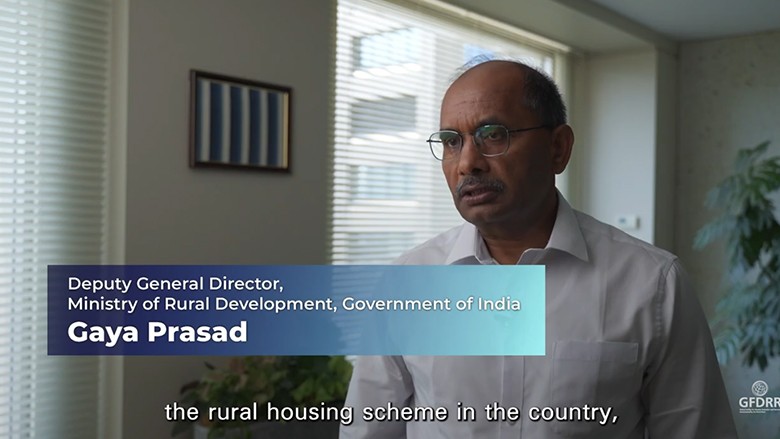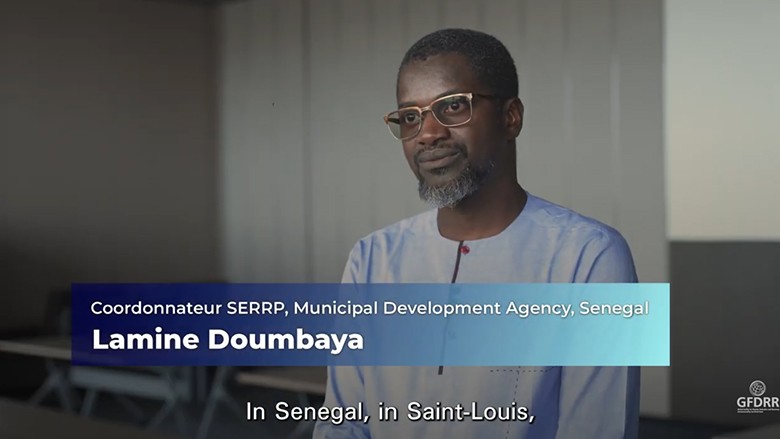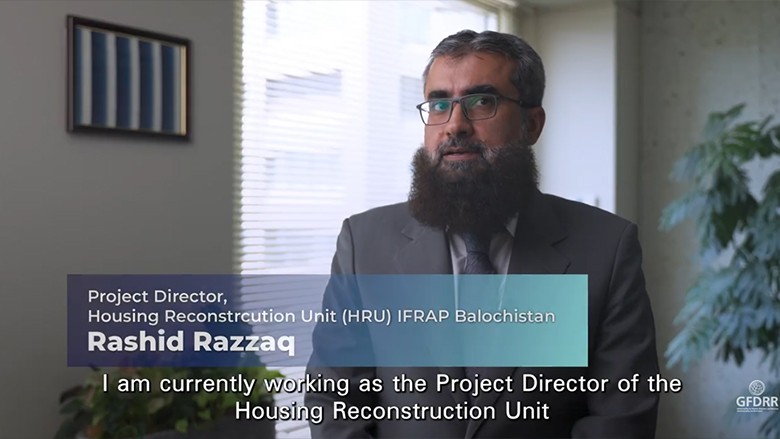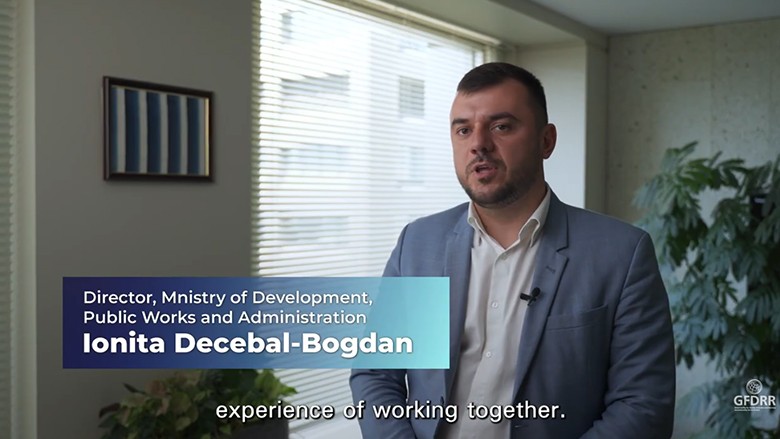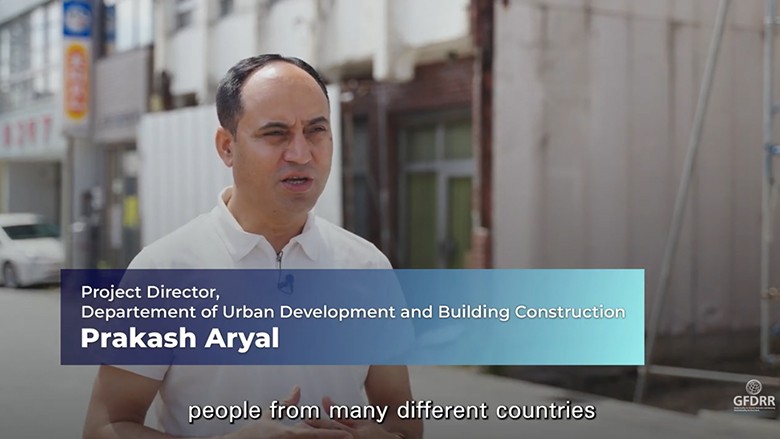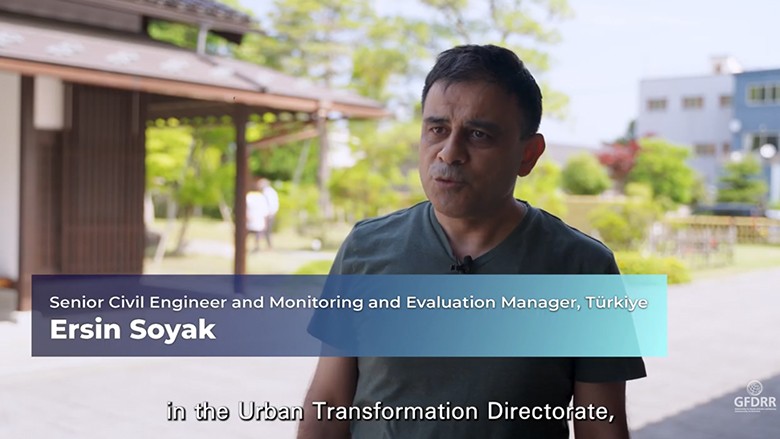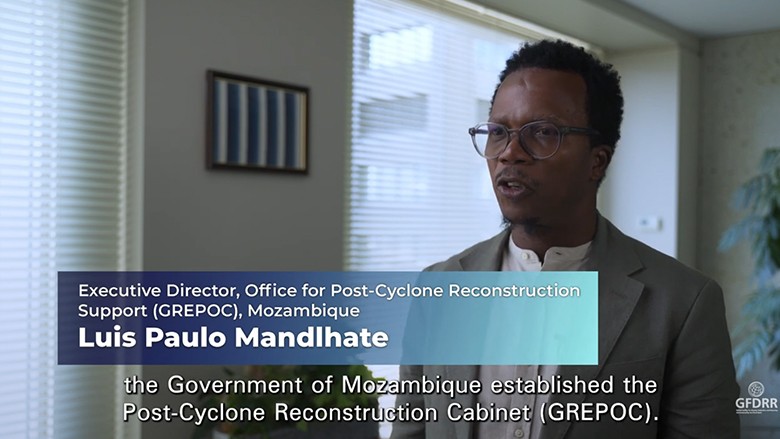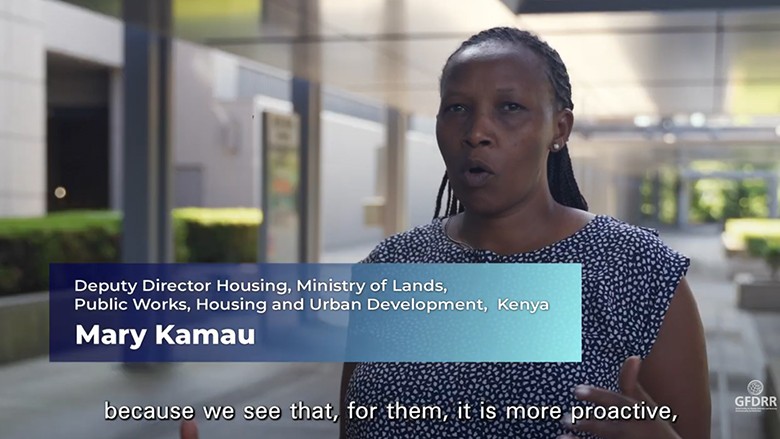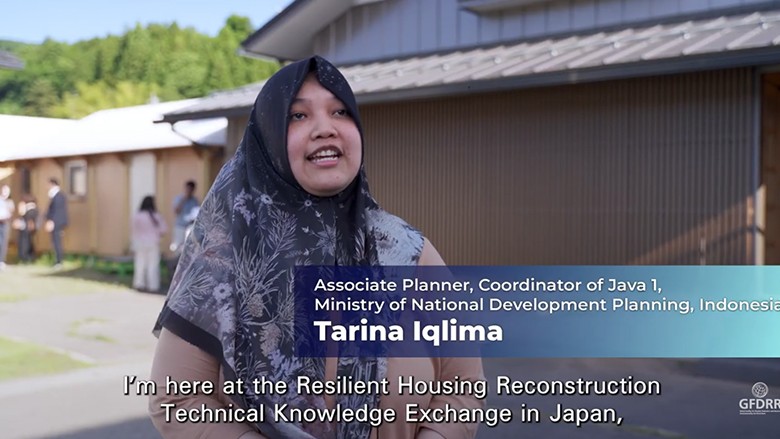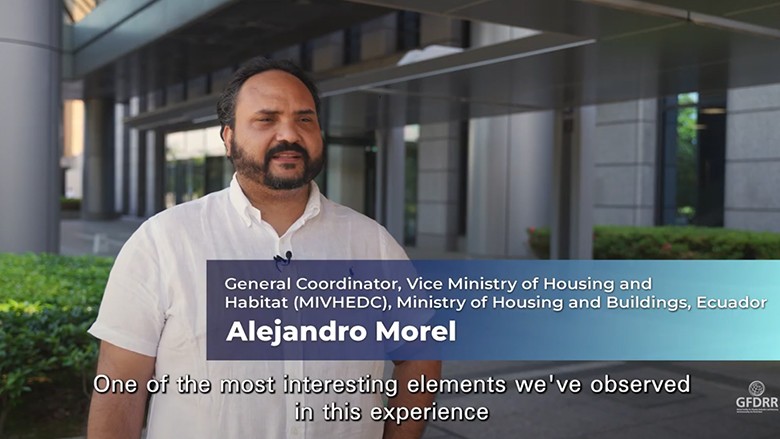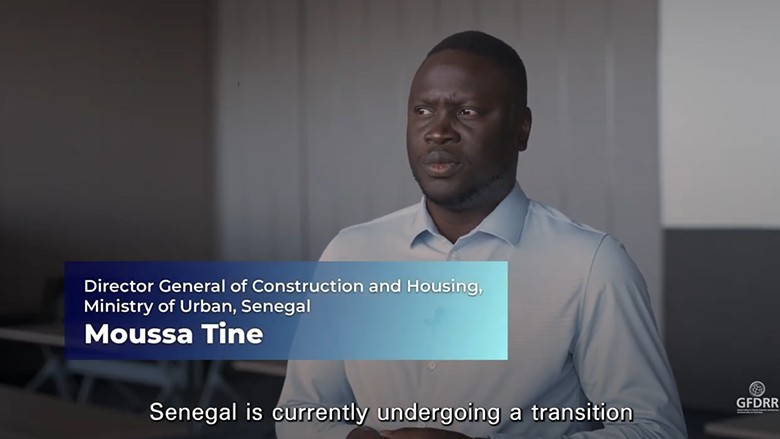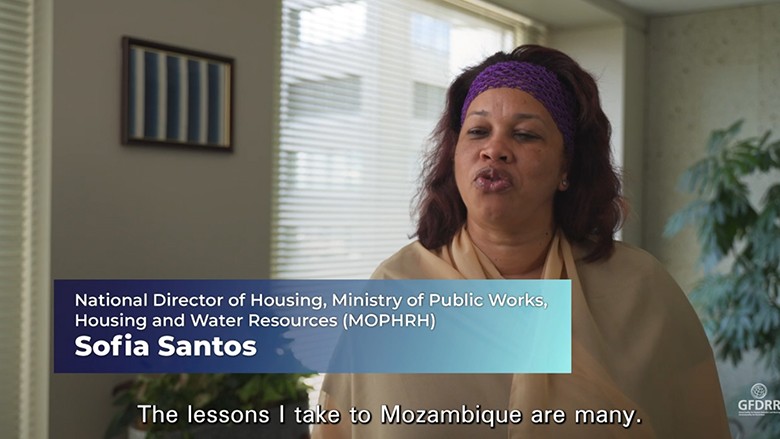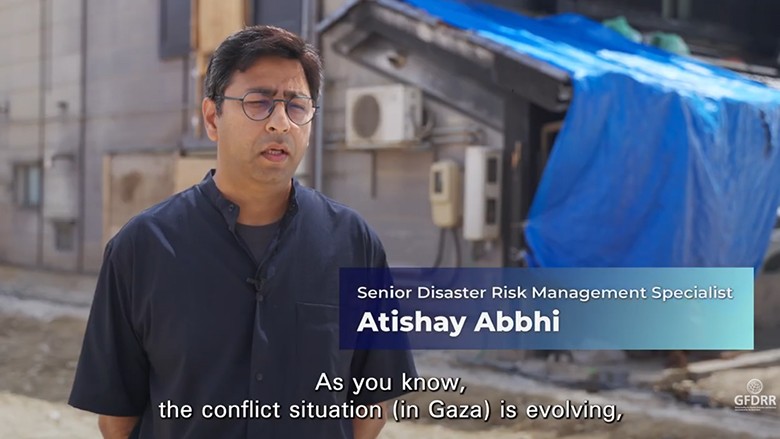Japanese subtitle version : 日本の住宅復興から学ぶ:レジリエントな住宅再建の技術交流(2025年6月)
- Overview
- Presentations
- Site Visit
- Tools Developed and Tested
- Lessons Learned
The global housing crisis is intensifying, with 100 million people unhoused and 1.8 billion living in inadequate conditions. By 2030, three billion people will require safe, affordable housing—equivalent to 96,000 new units every day. Natural hazards, rapid urbanization, and climate change compound this challenge, leaving vulnerable populations at most risk. Post-disaster reconstruction offers a critical opportunity to “build back better,” yet a World Bank review of four decades of projects show persistent gaps: weak institutional coordination, limited local capacity, market constraints, design shortcomings, and incomplete land data.
Japan’s experience offers a model for resilience. Three lessons stand out:
1. Preparedness over reaction: budgets, roles, and procedures are established in advance for rapid and coordinated action.
2. Forward-looking, localized design: innovations such as two-story wooden units and elderly-friendly layouts address both immediate and future needs.
3. Speed with quality: linking housing recovery to jobs, economic revitalization, and social empowerment.

LEFT: Appearance of prefabricated type temporary housing
RIGHT: Inside of the new types of post-disaster housing
Building on these lessons, a technical exchange brought together 35 government officials and World Bank staff from Dominican Republic, Ecuador, India, Indonesia, Kenya, Mozambique, Nepal, Palestine, Pakistan, Romania, Senegal, and Türkiye to strengthen resilient housing capacity. The program combined global and Japanese insights with field learning in Ishikawa Prefecture, observing reconstruction after the Noto Peninsula earthquake. Participants explored disaster waste management, 3D-printed housing, and community-oriented design—seeing firsthand how housing recovery intertwines with livelihoods, culture, and social cohesion.
Luis Triveno, organizer of the knowledge exchange, discusses the importance of resilient housing reconstruction and shares why Japan’s experience offers valuable lessons for countries facing disaster risks.
“Japan’s strength lies not only in what it is today, but in how it got here. In a new climate normal of more frequent, intense disasters, the ability to deliver housing solutions to everyone, fast, is vital—and it can’t be built overnight. Japan shows why we must shift from ‘build back better’ to ‘build better before’.” —Luis Triveno, lead for resilient housing thematic area at the World Bank’s Global Facility for Disaster Reduction and Recovery (GFDRR)
Participants emphasized the need to embed preparedness and resilience in housing policy—modernizing cadastral systems, strengthening regulations, and forging public-private partnerships. They also called for pre-disaster financing, targeted subsidies, and affordable loans to expand retrofitting and resilient construction.
GFDRR’s Tokyo Disaster Risk Management Hub and the resilient housing thematic area are now developing tools and knowledge products, such as a resilient housing snapshot and participatory scenario-building guides to help countries translate lessons into action.
“For Ecuador, it has been surprising to see how quickly and efficiently Japan responds to emergencies, similar to those we face. We are learning a lot from this experience. Temporary housing is something we've considered before, but we haven’t yet implemented it. This is an option we plan to seriously explore for future use.
Jorge Burneo from Ecuador discusses Japan’s experience in financing and managing reconstruction, with a focus on community engagement and technological innovation.
“Another key takeaway from this comprehensive visit to Japan is the quality and type of materials used. Japanese experience has also made very clear that we need an integrated response that includes not just building new housing but also managing the social aspects. This means creating new opportunities for people to rebuild their livelihoods, not just giving them a place to live. We believe these experiences can be successfully adapted for Ecuador in the future, whether in response to earthquakes, tsunamis, or other natural disasters.” —Jorge Alfredo Burneo Suarez, Deputy Minister of the Ministry of Urban Development and Housing, Ecuador.
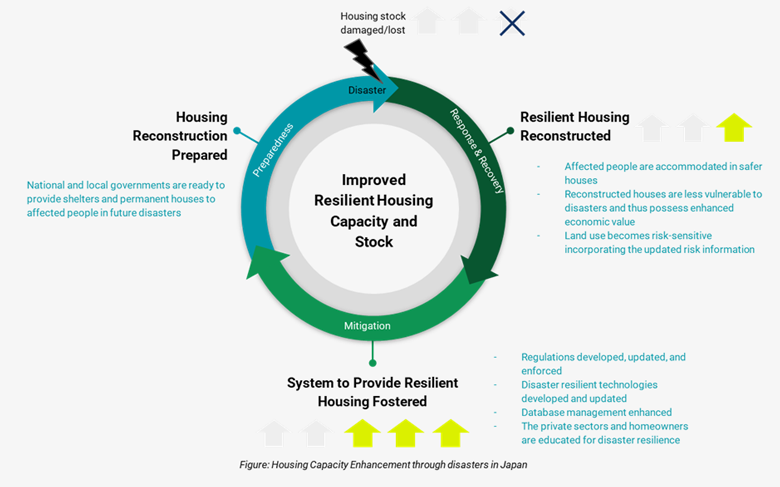
Note: This knowledge exchange program was designed around the concept of “Resilient Housing Capacity,” defined as the ability of governments and societies to provide resilient housing solutions to all individuals before, during, and after disasters and climate shocks.
Detailed reports are available upon request. For further information, please contact Yasuhiro Kawasoe (ykawasoe@worldbank.org), Disaster Risk Management Specialist at the World Bank Tokyo Disaster Risk Management Hub.
Keynote Presentation: Housing Reconstruction: Global Trends and Importance
Professor Mary Comerio (UC Berkeley) and Mr. Luis Triveno (World Bank) highlighted the importance of resilient, inclusive housing in disaster recovery. Their presentation focused on five key areas: institutions, markets, legal systems, communities, and finance. They emphasized that measuring these dimensions helps identify weaknesses and ensures vulnerable groups are not excluded. Treating housing reconstruction as a core policy objective enables countries to scale solutions, reduce costs, and adapt to climate change.
Policy Framework on Housing Reconstruction in Japan
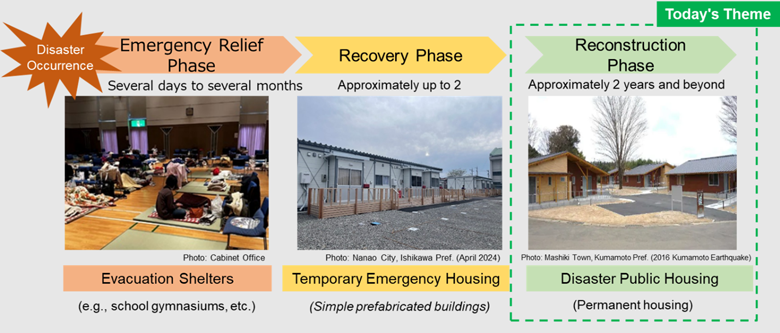
Officials from Japan’s Cabinet Office and the Ministry of Land, Infrastructure, Transport and Tourism (MLIT) presented the country’s legal framework for housing reconstruction, covering the process from damage assessment and evacuation to the provision of transitional and permanent housing. They described how transitional shelters are subsequently repurposed as community centers and clarified MLIT’s specific responsibilities in the development of permanent housing. This session gave participants a clear understanding of institutional roles and provided essential background information in preparation for the upcoming field visit to the Noto Peninsula.
Housing Reconstruction in Japan: Policies and Examples
Associate Professor Haruka Tsukuda (Tohoku University) described Japan’s housing recovery process: evacuation, temporary housing, disaster public housing, and permanent communities. Recovery planning involved information sessions, surveys, and resident workshops. Local governments managed land, planning, and construction with national support. Key success factors included strong preparation, legal guarantees, local capacity, participatory decision-making, and ongoing knowledge-sharing.
Situation of Housing Reconstruction in Ishikawa Prefecture and the Role of Prefecture
Ishikawa Prefecture Government officials explained that rapid housing reconstruction in Ishikawa was enabled by clearly defined roles for prefectural and local governments, robust legal frameworks, and advance agreements with partner organizations. A dedicated department oversees the management of temporary housing, with the private sector responsible for construction and local governments allocating units based on household composition. Governance was strengthened by a special body created after the Noto Earthquake, standard audits, and strategic procurement processes, allowing for efficient allocation and the ability to house residents from other prefectures.
Collaboration with the private sector, academia, NGOs, and specialized agencies
Koichiro Tadokoro of UR Agency explains the agency’s role in disaster risk management and highlights the most important elements for effective resilient housing reconstruction in Japan.
Moderated by Professor Mary Comerio, the Global Cafe style discussion highlighted key expectations for disaster housing partnerships: providing technical expertise and resilient housing, engaging communities, ensuring timely and flexible response, maintaining transparency, and strengthening institutional and local capacity. Common challenges include reactive partnerships, local government capacity gaps, weak pre-disaster coordination, financing delays, and inconsistent standards. Recommendations included formalizing pre-disaster agreements, creating knowledge-sharing platforms, investing in monitoring and evaluation, building local capacity, promoting inclusive solutions, and expanding partnerships to co-create policies and innovations.
Housing Reconstruction in Urban and Densely Populated Settings

A Tokyo Metropolitan Government official emphasized that, while resilient housing is essential, damage from large-scale disasters cannot be fully prevented. This underscores the importance of planning for reconstruction during normal times, using projected damage scenarios to guide proactive urban redevelopment. Tokyo strengthens its post-disaster planning capacity through comprehensive urban planning strategies and practical resilience solutions. The government also prepares hazard maps tailored to regional characteristics, collaborates with municipalities to provide timely evacuation information, and promotes fireproofing and seismic strengthening in high-risk, densely built wooden housing areas through the use of risk maps and targeted subsidies.
The panel discussion, moderated by experts from India, Kenya, and Türkiye highlighted that effective housing reconstruction relies on clear institutional coordination across national, local, and inter-ministerial levels, as demonstrated in India, Japan, and Kenya. Mobilizing private sector capacity and integrating it with public programs, such as Kenya’s procurement approaches and India’s scheme convergence, enables faster and scalable recovery. Panelists emphasized the importance of robust legal and land systems, including land-use planning, property rights, and digitization, to support preparedness and land readjustment.
Transitional shelter – a phased approach for reconstruction

Panelists from Indonesia, Mozambique, Nepal, and Peru highlighted the value of community-led housing, such as owner-driven and incremental construction using local materials, supported by cash grants and training. They emphasized the need for robust institutional frameworks—clear mandates, pre-approved designs, and formal transitional housing policies—for swift, coordinated response. Blended financing strategies, including subsidies, loans, emergency funds, and social protection, are essential for scalable, inclusive housing solutions. Pre-secured land, inclusive planning for marginalized groups, and integration with livelihood recovery were also identified as key factors for sustainable rebuilding.
- Presentation: Securing Housing for Disaster Victims (Mr. Manabu TATEOKA, Chairman of NPO One Family Sendai, Director and Secretary General of the Housing Support National Network, Managing Director of the Personal Support Center General Incorporated Association and PSC Plus LLC Managing Partner) – English / Japanese
Participants visited the Noto Peninsula, witnessing firsthand the ongoing recovery from the 2024 earthquake and flooding.
Exploring Temporary Housing Solutions
1. Conventional Prefabricated Temporary Housing
Participants toured prefabricated units, noting their rapid deployment and basic living standards. This was made possible through collaboration among Ishikawa Prefecture, Suzu City, and the private sector, including the Japan Prefabricated Construction Suppliers and Manufacturers Association.

LEFT: Appearance of prefabricated type temporary housing
RIGHT: Interior view of prefabricated type temporary housing
2. Hometown-Return Temporary Housing
This type of housing reconstruction, introduced after the Noto earthquake, consists of independent units designed to resemble traditional Japanese homes. A unique feature is that, although developed as temporary housing, these units can be converted to permanent residences. Residents have the option to stay for more than two years. Participants noted differences in design and potential future use compared to prefabricated housing.

LEFT: Exterior view of moving house-type temporary housing
RIGHT: Interviews with prefectural officials
3. Community-Oriented Temporary Housing (DLT Type)
After learning from the Voluntary Architects’ Network, participants visited DLT housing, spoke with residents, and learned about the benefits and challenges of community-based temporary housing versus prefabricated options.

LEFT: Inside of the new types ofpost-disaster housing
RIGHT: DLT Type Temporary housing by VANtest
4. 3D Printed Houses
Participants saw Japan’s emerging 3D printed housing technology in action. Although still new to the market, three more units are planned for the Noto Peninsula, and the feasibility of this innovative approach is being explored.

LEFT: Presentation by Mr. Seiji Handa (Srendix Inc.)
RIGHT: Exterior of the 3D printer house
Reviving Local Livelihoods (Wajima Lacquerware Workshop, Kirimoto, Paper Tube Temporary Workshop)
Participants saw how rapid recovery efforts in Wajima City focus on both housing and local economic facilities. Innovative construction using paper tubes, previously applied in community-oriented temporary housing, was also used for temporary workshops—demonstrating its effectiveness for quickly restoring housing and industry in disaster-affected areas.

LEFT: Listening to an explanation of the Wajima lacquerware technique
RIGHT: Listening to an explanation about the industrial recovery process in the temporary workshop
Citizen-Led Recovery (Ipponsugi-dori Shopping Street)
Participants learned about resident-driven reconstruction and community recovery challenges. The residents emphasized the need for strong livelihood and industrial support alongside housing restoration, and highlighting the importance of improved institutional frameworks.

LEFT: A model of the shopping district before the earthquake was used in formulating the regional reconstruction plan.
RIGHT: Staff at a restaurant in a temporary shopping district explain the process of rebuilding their business after the earthquake.
Hisashi Takazawa explains the impact of the Noto Peninsula earthquake on Ipponsugi Street, sharing key lessons and aspects for international delegates to take back to their countries.
Participants visited a community center, attached to temporary housing and offering welfare services. The center, established before the disaster, welcomes all residents—children, elderly, and people of diverse backgrounds—by utilizing vacant houses in central Wajima City. Public baths and a cafeteria foster community ties among temporary housing residents and neighbors, helping prevent disaster-related deaths.

LEFT: Presentation of Community center and their actibities
RIGHT: Presentation of their actibities after the disaster
The event served as a dynamic platform for developing and rigorously testing two tools aimed at strengthening preparedness and institutional capacity for housing recovery. These innovations foster proactive planning, institutional resilience, and equitable reconstruction—ensuring that communities can rebuild swiftly and sustainably after disasters.

LEFT: Meguro-Maki Workshop to Summrize the Timeline for Housing Reconstruction Activities
RIGHT: Group Discussion to Identify the Challenges and Next Steps for the Participating Countries
Tool 1: Participatory Scenario-Based Workshop (Meguro-Maki)
The first tool introduced was the Participatory Scenario-Based Housing Reconstruction Workshop, anchored by the Meguro-Maki visual planning instrument developed by Professor Kimiro Meguro of the University of Tokyo.
- Purpose: This interactive, visual exercise empowers participants to cultivate "disaster imagination"—the ability to anticipate and simulate complex post-disaster decisions over short-, medium-, and long-term horizons (spanning up to 8–10 years after an event).
- Approach: Using a timeline scroll and color-coded sticky notes, stakeholders collaboratively map the entire lifecycle of housing reconstruction, from immediate impact to long-term resilience. This hands-on methodology enables participants to proactively identify bottlenecks, refine strategies, and clarify the roles and responsibilities of various agencies.
- Outcomes: The workshop proved to be a rich environment for sharing experiences, simulating real-world decision-making, and generating actionable policy recommendations. Participants left with enhanced institutional capacity and operational readiness, equipped to address the complexities of post-disaster housing recovery.
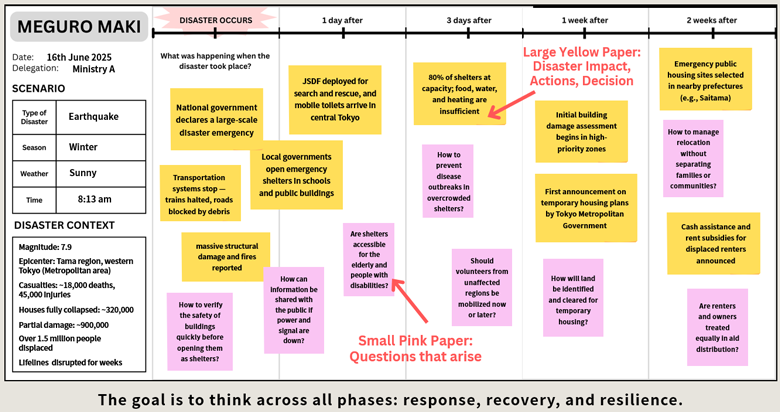
Tool 2: Rapid Diagnostic for Resilient Housing Capacity
The second tool, the Rapid Diagnostic for Resilient Housing Capacity, is a swift, dialogue-driven instrument designed to facilitate immediate assessment and strategic action.
- Purpose: This tool enables governments and development partners to quickly establish a shared understanding of a country’s resilient housing capacity and pinpoint priority gaps before, during, and after disasters. Its rapid, indicative nature supports timely, informed investment decisions.
- Approach: Users complete a concise questionnaire based on a simple Likert scale, evaluating the presence, usability, and reach of key enablers such as data systems, standards, finance, and inclusion. The assessment covers six critical domains: Housing Gap and Needs; Land Provision and Regulation; Standards and Technologies; Institutional and Policy Framework; Markets and Civil Society; and Finance and Public-Private Partnerships.
- Visualization: Results are instantly aggregated into a radar (or star) chart, providing a clear visual snapshot of strengths and gaps. This enables teams to quickly identify systemic weaknesses and prioritize "no-regret" investments and institutional strengthening efforts.
By piloting these tools during the technical knowledge exchange, participants validated their effectiveness and gained a structured roadmap for building capacity, enhancing coordination, and ensuring that future housing recovery initiatives are both effective and equitable. These innovations represent a significant step forward in empowering countries to respond to disasters with agility, inclusiveness, and resilience.
Sample Rader Chart tested during the event
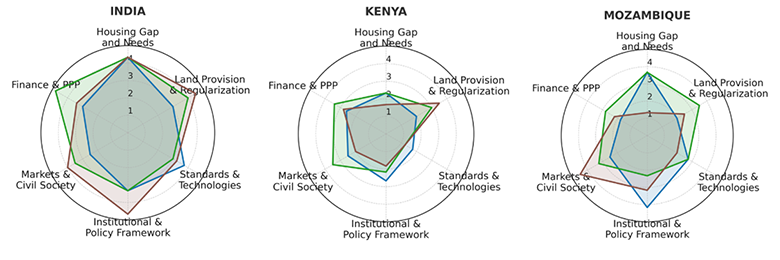
This technical knowledge exchange highlighted the urgent need to strengthen national capacity for resilient housing. Investing in resilience reduces disaster impacts, minimizes damage to homes and infrastructure, and accelerates recovery.
Lessons drawn from Japan and participating countries are organized around six pillars, showing that proactive planning not only protects lives and property, but also supports long-term sustainability and community well-being.
1. Housing Gaps
- Regularly assess housing demand and supply, especially in disaster-prone areas, to ensure safe homes are available when needed.
- Flexible recovery plans are essential, as actual needs often exceed initial estimates after disasters like the Noto Peninsula Earthquake.
2. Land Provision
- Securing safe land for reconstruction is challenging due to weak records; Updated cadastral systems and hazard mapping help speed up rebuilding.
- Pre-identifying multiple housing reconstruction sites including sites for shelter, temporary and permanent housing reconstruction, and debris management are crucial for effective response.
3. Standards & Technologies
- Outdated codes and weak enforcement leave homes vulnerable; Strong regulatory frameworks, like Japan’s Building Standards Law, ensure quality and resilience.
- Emerging technologies, such as prefabricated buildings and 3D-printed homes, coupled with local techniques like the use of timber in Japan, offer faster and more affordable solutions when paired with robust standards.
4. Policy Framework
- Clear legal roles and coordinated action, including well defined roles of subnational and local governments, are vital for recovery.
- Hazard-specific protocols and “Build Back Better” principles should be embedded in laws.
- Regularly update legislation to address evolving risks and improve disaster response.
5. Market & Civil Society
- Pre-disaster agreements with industry enable rapid housing reconstruction.
- Recovery should restore communities and livelihoods, not just shelter.
- Greater involvement of NGOs, academia, and the private sector—and inclusion of vulnerable groups—builds trust and resilience.
6. Finance
- Japan funds reconstruction through public budgets and a layered system of subsidies, insurance, and affordable housing.
- Pre-disaster financial tools—like catastrophe bonds and microfinance—can accelerate resilient housing and reduce future damage.






